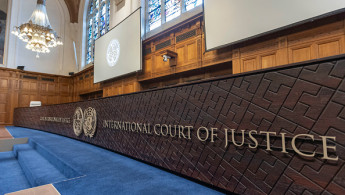ICJ: Israeli policies in occupied Palestine amount to apartheid, discrimination
The United Nations' highest court said that Israeli settlements in occupied Palestinian territories are illegal and all states should cooperate to bring an end to Israel's war on Gaza, in an important advisory opinion issued on Friday.
The findings by judges at the International Court of Justice (ICJ), known as the World Court, are not binding but carry weight under international law and may weaken support for Israel.
"Israeli settlements in the West Bank and East Jerusalem, and the regime associated with them, have been established and are being maintained in violation of international law," President Nawaf Salam said, reading the findings of a 15-judge panel.
The opinion said that Israel should pay reparations to Palestinians for damages caused by the occupation.
It also found that the UN Security Council, the General Assembly and all states have an obligation not to recognise the occupation as legal and not to give aid or support toward maintaining it.
The ICJ concluded that Israel's policies and practices in the Palestinian territories amount to the annexation of significant portions of these areas.
Furthermore, the court determined that Israel systematically discriminates against Palestinians in the occupied territories, as it argued the unlawful nature of Israel's continued presence there.
The case stems from a 2022 request from the UN General Assembly, predating the war in Gaza that began in October.
Israel has occupied the West Bank, Gaza Strip and East Jerusalem — areas of historic Palestine which the Palestinians want for a state — since the 1967 War and has since built settlements in the West Bank and steadily expanded them.
Israeli leaders have argued the territories are not occupied in legal terms because they are on disputed lands, but the United Nations and most of the international community regard them as Israeli-occupied territory.
In February, more than 50 states presented their views before the court, with Palestinian representatives asking the court to find that Israel must withdraw from all the occupied areas and dismantle illegal settlements.
Israel did not participate in the hearings but filed a written statement telling the court that issuing an advisory opinion would be "harmful" to attempts to resolve the conflict.
The majority of states participating asked the court to find the occupation illegal, while a handful, including Canada and Britain, argued it should refuse to give an advisory opinion.
The United States, Israel's strongest backer, urged the court to limit any advisory opinion and not order the unconditional withdrawal of Israeli forces from the Palestinian territories.
In 2004, the ICJ gave an advisory ruling that an Israeli separation barrier around most of the West Bank was "contrary to international law" and Israeli settlements were established in breach of international law. Israel dismissed the ruling and has continued settlement construction and expansion.




 Follow the Middle East's top stories in English at The New Arab on Google News
Follow the Middle East's top stories in English at The New Arab on Google News
![A group of Palestinians, foreign and Israeli activists gather to participated in an olive picking event on the land in the town of Battir, which is under threat of confiscation by Israel in Bethlehem, occupied West Bank on 8 November 2024. [Getty]](/sites/default/files/styles/image_330x185/public/2182930803.jpeg?h=199d8c1f&itok=__0LgGsa)

![People gathered around the rubble of destroyed houses to search for survivors [Getty]](/sites/default/files/styles/image_330x185/public/2024-11/GettyImages-2184733820.jpg?h=199d8c1f&itok=NiM1LO2f)